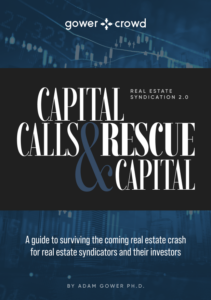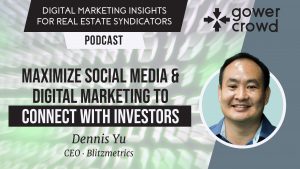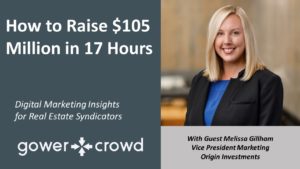Podcast Episode 307: Brent Hieggelke, CMO CrowdStreet,
Real Estate Syndication Best Practices

CrowdStreet is the single most successful real estate syndication - or crowdfunding - platform on the web today, and Brent Hieggelke is the power behind their digital marketing.
Brent built his first website in 1995 (with duct tape and elastic bands in those days, I presume), founded the first vacation rental site, Second porch before exiting to HomeAway, and has been quoted in the Wall Street Journal, Forbes, Advertising Age and hundreds of other publications.
Now my guest here on the Real Estate Crowdfunding Show, Brent has reached the zenith of his career.
See below for more links to Brent and CrowdStreet.
What You're Going to Learn
* Why having online savvy means raising more capital
* How being authentic online will serve you well
* Best practices for launching your digital presence
* Keys to sustaining an online strategy
* How to dominate real estate syndication online
* Ways to stay on top of changes in social media
* The social media mindset
* How to be relevant online
And much, much more.
Listen or Watch the Full Podcast Here
Show Highlights
Why Taking Syndication Online is Inevitable
Adam Gower: Tell me a little about the reverse of that. When real-estate sponsors start looking at digital marketing, what are the biggest challenges they have, do you suppose, and how do you suppose they can get over that? What are the biggest hurdles?
Brent Hieggelke: Sure. I think, as an industry, real estate- commercial real estate, probably more than any other part of real estate, has been sort of slow to adopt digital experiences, and digital channels, because, frankly, they just haven't needed to.
It's obviously an ancient industry. We've been building commercial buildings for centuries. Really, what was the impetus to move to digital experiences, because it's a largely offline experience.
I think what's happening now is, like every other industry, it's sort of inevitable. The idea of finding a more efficient way to market, and to raise capital for projects is inevitably moving online, because the investors are living online.
If you want to be relevant with investors, you need to have a digital presence. You need to be online, because that's where they are. Certainly, as new pools of investors become interesting to sponsors, if you're not relevant to them, in the world they live in, then they're not going to find your projects make sense to them.
It's really inevitable, and we're seeing, now, sponsors realizing that you have to make the move, and better sooner, rather than later, because, even though you may not need it - you might be able to raise capital for your projects using your old-school networks - but it's inevitable that you're going to need to make the plunge at some point.
Why not get started now, and learn it? Become proficient with it, and become a leader versus a follower. That's really ... The folks we're working with have that mindset.
Online Savvy
Adam Gower: Have you found that sponsors that do have a good social-media presence are more effective, when it comes to raising capital, kind of on a global level?
Brent Hieggelke: I think so, because what you find, today, is if somebody is looking to invest in a project, and they want to do their own homework, very quickly, what they do is they go look up somebody's social-media presence; just like when you meet somebody in real life, and you might be intrigued by them, or you wonder if they're somebody you want to keep in touch with.
Brent Hieggelke: Typically, you go to one of their social-media profiles, and you check them out. What are they posting? What are they talking about? What kind of comments are they making? Do they seem to resonate in the same way, with the same values that perhaps resonate with you, as an individual? If the answer is yes, then you feel a connection, and you say, "Okay, great ..."
I think people increasingly are turning to business relationships in much the same way. This isn't just in the real-estate world, or sponsor world, this is across all industries. I was just reading, actually, a Fast Company article about Wendy's Twitter account, and it's phenomenal. Wendy's has taken the old ... You probably remember the campaign, the "Where's the Beef campaign.
Adam Gower: I do!
Brent Hieggelke: They took that sassy attitude, now, and they're trash-talking McDonald's, and Burger King on Twitter, and it's blowing up for them. It's creating growth in an industry that's sort of stagnant. The point is this is happening across all brand relationships. Consumers want to treat a brand like they treat a connection on their social profile, and so, that's going to bleed over.
Brent Hieggelke: It may not be here yet. Some people might be hearing this, and saying, "It just doesn't make any sense to me," but the consumer that you're going to- the investor you're going to want in a few years, that's going to be inherently built into them.
Brent Hieggelke: They're going to say, "I want to invest in this project, but I don't feel like this is an organization that talks to me, or has my values, or necessarily I want to be involved in."
Brent Hieggelke: It may sound a little bit far-fetched today, but today's consumer is very quickly adopting that mindset of really caring about company's, or organization's values, and mindset.
Being Authentic
Brent Hieggelke: Absolutely, and you've got to be ... Like I said, you've got to resonate with them individually. It's not just a matter of having a social-media presence. It's having one that's going to connect with them on an attitude level. They've got to look at what you're doing - the photography, the videography, the things you're sharing, or things you're choosing to share. The curating of the content, as crazy as it may sound, really does matter.
Adam Gower: Do we need a Hollywood studio in the back room to do this properly? Seriously.
Brent Hieggelke: Yeah, yeah, you don't. The good news is that the basic technology tools ... You can get fantastic photos, and video capture now. We're seeing films captured on smartphones. You don't need ... I think consumers are not looking necessarily for the highest production quality. They're looking for just-good-enough production quality.
Brent Hieggelke: What they're really more interested in is what are you capturing? What are you capturing? What are you talking about? What's important to you? Are you willing to be authentic, and transparent?
Brent Hieggelke: If you're showing projects being developed, is it all glitz and glamour, or are you showing the authentic experience? "This is the project site. This is what we're building on. It may not be ready yet, but we're excited about what this is going to look like."
Brent Hieggelke: There's all sorts of ways to embrace what's real, and authentic, and share that. It doesn't need to be polished in a Hollywood way, at all.
Launching Your Online Presence
Adam Gower: What about the different media, Brent? I think of written articles, audio, video, webinars, et cetera, et cetera. What's the hierarchy, do you suppose, for a sponsor who's never done it before, to think about what to do first. Then, in terms of what's most effective, and what way are they effective?
Brent Hieggelke: I think you have to start by having some sort of website that you own, and operate. You think about it as owned-and-operated channels. First thing is obviously a website. You need to decide how deep that website should go. There's great templates out there now. It doesn't need to be a $100,000 project.
You can build a very proficient website, probably for a few thousand dollars that covers the basics: What have you done before? Who's behind the projects? What are your backgrounds? Again, a little bit about maybe your values, and what your goals are; philosophies, that sort of thing. That's really probably sufficient today.
Then, building out social-media profiles - Facebook, LinkedIn, Instagram, probably the three. Twitter, to some degree, may be relevant. Snapchat probably isn't mandatory today, yet, but it could be. When those investors are now in their 30s, and 40s, it could be the case that you'd need to be there.
I think if you focus on Facebook, Instagram, LinkedIn, you're pretty well-covered. I think today's investors will check you out on one of those channels, and if you're there, they'll say, "Great. They're speaking to me."
Sustaining a Strategy
Adam Gower: The biggest barrier, I would imagine - you tell me what you think - is that a sponsor that's never done this before suddenly thinks, "You know what? I'm already working 60 hours a week; 60-80 hours a week. I don't have time for all this." How do you make that- how do you cross that barrier, in terms of ... The impression is that once you start on one of these, you're never off it. It's like you might be doing this all day, instead of building.
Brent Hieggelke: It's a fair point, because it's almost worse to have a social-media profile that is woefully out of date, because then it looks like you tried it, and failed. I would say, yes, if you don't have a sustaining strategy, then you don't want to get started, because you will ultimately look worse by having something that's not being fed, and nurtured, than by not doing it at all.
That being said, it doesn't need to be an overwhelming chore. Again, back to the idea that these don't need to be highly produced videos, or photography, it can be very much on-the-fly type moments.
If you, the sponsor, yourself, are going to actually do this, then then keep it that way. That becomes your- the style you're developing, which is very much on the fly; thoughts of the moment; not highly produced; not highly curated; which then feels very authentic. People say, "Oh, this person's just sharing a couple moments of their day. Very authentic. I feel a connection that person."
If you want to make it a little bit more highly produced, the good news is you can hire somebody young, right out of college; don't have to pay them a lot of money. They'll be delighted to basically mash up your personal-life passions with a professional opportunity. I don't think you need to spend a lot of money on it. You can hire somebody on a freelance basis, just to do this. It doesn't need to cost a lot of money, and it can be very professionally done.
How to Dominate Syndication Online
Adam Gower: Actually, have you seen anybody in real estate, commercial real estate, do that, and, is it prevalent? Do you really think that it is a good first step, rather than something that is more structured, and kind of pre-thought-out?
Brent Hieggelke: I can't probably point you to specific case studies, where I'd say, "This is the perfect model." I'm throwing this out as kind of a thought bubble, in terms of where is this industry going? If you want to follow what other industries are doing, we're going to get there.
Is somebody daring enough to do that today? You're right, there aren't lots of use cases out there. Are we going to see somebody take that first step, though, in the next year? I bet we will, and they will like it, and [cross talk]
Adam Gower: I love that you are ... Brent, I love that you are saying that, because, to me, that is ... Look, what I do, as you know, is I help sponsors make that jump to go from - worse is having something that looks outdated - from either that, or from nothing, to a pretty sophisticated platform of online presence. What I really want someone to do is to take that leap, and be a personality; just to be authentic; to just say what it is that they're doing, and just be natural about it, right?
Brent Hieggelke: Right, exactly, yeah. If you look at the stock-investing world, I'm a fan of Jim Cramer, Mad Money. I think he's turned a very boring industry into an entertainment show. Whether you agree with his recommendations is besides the point. The point is you can watch an episode of that show, Jim Cramer is being full of antics ... Full of antics, but he's turned it into a sport, and entertainment.
I'm not saying commercial-real-estate sponsors should go that far, but just take a little bit of the inspiration from that. There's something fresh, and modern-feeling about people letting their guard down a little bit. Look, we see offering memorandums; we see the very professional photography; the very professional drone videos ... Beautiful, right? That's table stakes.
What is going to surprise people, in the next phase, are folks that are actually out there being real, because we all know that these are highly complex projects. While you want to portray that every single thing is exactly as planned, exactly on budget, exactly to the timeline, everybody knows that's not the case.
I think there's more believability in somebody being authentic, than saying, "Everything is perfect. We didn't miss a single ... There's not a single mistake made. There's not a line item ..." [cross talk]
Adam Gower: -anyone that says that there's no ... Run!
Brent Hieggelke: Exactly. Exactly.
Staying on Top of Changes
Adam Gower: You've alluded to ... Actually, we talked about organic reach changing over time. You've predicted the possible rise of Snapchat. Let me ask you this: how do you, as a social-media wizard, stay on top of those changes? Literally, how do you do that on a daily basis? How do you feel where the pulse is, and make sure you're in the right place?
Brent Hieggelke: Besides GowerCrowd [cross talk]
Adam Gower: Of course!
Brent Hieggelke: I mean, say no more, right? It's all right there.
Adam Gower: How do I send you ... I need to pass you a quick fiver for that.
Brent Hieggelke: I'll take the T-shirt, please. I do find that, ironically, the social followings I have are probably the best source, because what I've done - and, I think, what a lot of people have done - is I've curated, across my social networks, people that I respect, and people that I think have good opinions, and people that share worthy articles, or their own worthy insights.
I find that Facebook, to me, is less about connecting with friends, and family, today, and more about looking at what the people I respect are putting out there. Then, LinkedIn, obviously even more so, on a business level - people sharing professional updates.
Then, Twitter ... For me, Twitter is a lot of people shouting, and I don't spend a lot of time on there, and I kind of ebb and flow on my personal engagement there. Obviously, you can find so many birds-of-a-feather resources there, that you can spend hours and hours. I think it becomes, to me, about how much time I can invest in it.
I do find myself spending more time just curating the people that I know are plugged in. I'm relying on their networks of the people they respect kind of funneling to me. That's how I view it.
The Social Media Mindset
Adam Gower: What does having a presence mean? For example, when I think about that, I think about the main channels right, the main social-media platforms. To be present means what? Writing articles? Making videos? Tweets?
You've already said it ... They never needed it. In fact, it was prohibited, so it wasn't just not needing it, because real estate has been able, and successful to raise capital, but it was actually prohibited to solicit online.
Now you've got this massive industry that has to make a leap to another massive industry - real estate making its leap to social media. We know that we have to do it, but what does that mean, just actually on a practical basis?
Brent Hieggelke: It means, I would say, engaging people, just like you're engaging people in your personal life. I think that's where it can become uncomfortable, because, like you said, the evolution of the industry ... This is brand new. Brand-new thinking, brand-new concepts.
The idea that people are openly sharing what they're doing, what they're working on - increasingly in video, and photography formats - is something that's- it's just a new mindset.
I think what I would say is sponsors need to think about bringing people into their organizations that are very comfortable with this, because, basically, teaching old dogs new tricks doesn't always work well, if it's not natural, because it may come off as not natural.
It may come off as contrived, and that actually almost backfires, because if you want to feel relevant - back to your original question - being relevant means that people just feel like you're in a natural part of the conversation. What I would say is they need to bring people into their organizations that have that DNA kind of inherently built in.
Being Relevant Online
Adam Gower: What does it take to be relevant? You said that you've got to be relevant online, so what does that mean, actually? Let's break that down a little bit.
Brent Hieggelke: It just means being part of the conversations that they're having. Where do people, today, spend discretionary time? Well, they spend it online. If you break down where they spend it online, they tend to spend it in social media.
They tend to turn to Facebook, Instagram, LinkedIn, Snapchat - all these new channels to connect with people. They also connect with brands on those channels, today, and they expect to connect with anyone that they're interested in doing business with.
Being relevant means having a presence that's contemporary, in tune with what's happening, and, frankly, just being part of the conversations that they're having.
RELATED PODCASTS
382 Dennis Yu, CEO of Blitzmetrics
Last Updated on September 15, 2021 by Dr. Adam Gower Dennis Yu, CEO of Blitzmetrics How to Maximize Social Media and Digital Marketing to Connect with Investors NEW BOOK BY…
READ MORE >320 Melissa Gillham, Vice President Marketing, Origin Investments
Last Updated on June 22, 2020 by Dr. Adam Gower WHITE BOARD WORKSHOP Need More Money to Finance Your Real Estate Projects? Learn how to find more investors, raise more…
READ MORE >384 Jessa Claeys, Managing Editor at Bigger Pockets
Last Updated on September 15, 2021 by Dr. Adam Gower Jessa Claeys, Managing Editor at Bigger Pockets The Art of Effective Real Estate Writing NEW BOOK BY ADAM GOWER PH.D.…
READ MORE >












